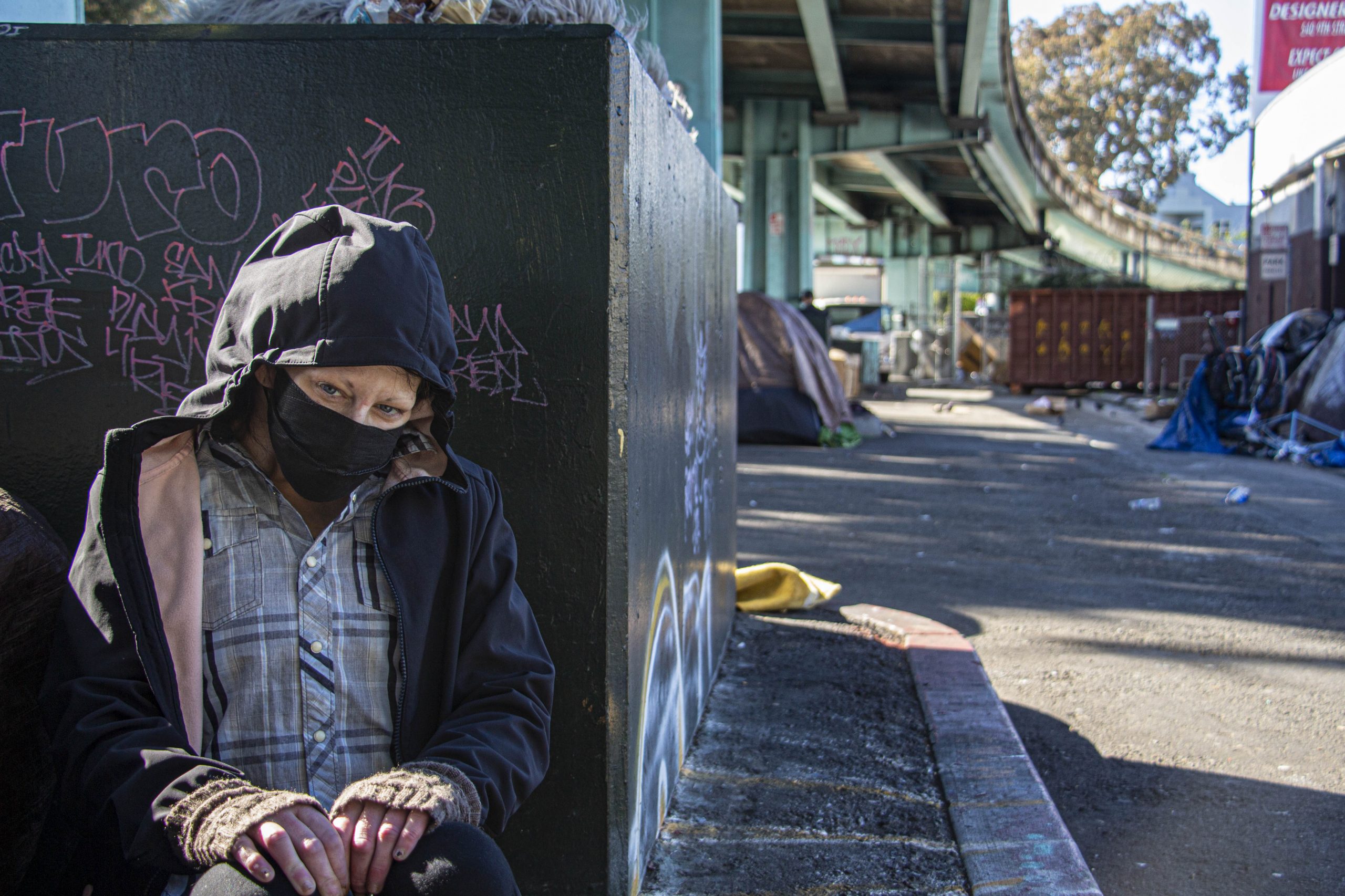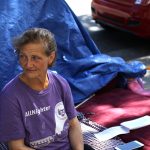Under a rumbling overpass on Dore Street, Moon Tomahawk stood next to his handmade cardboard home, the bill of his hat shading a weary-eyed smirk. A heart condition called endocarditis, an inflammation of the heart tissues or valves, leaves him more vulnerable to complications from the coronavirus, he said. But if offered one of the thousands of hotel rooms the city plans to roll out in the coming weeks, he said he would refuse. He fears catching the virus from city workers who staff the hotel and suspects he won’t be able to leave once inside.
“I don’t want to feel like I’m locked up in jail,” Tomahawk said over the thrum of freeway traffic, adding that he already practices social distancing by keeping to his cardboard shack as much as possible, only leaving to retrieve essential items.
“I could stay in my little box and that epidemic could run around me,” he said. One activist said close to one in five homeless people would balk at moving into the hotel rooms progressive city supervisors have been pushing to allocate for them.
That’s largely due to longstanding distrust in city agencies by homeless people who have been subject to move-along orders, police citations and sweeps that resulted in their tents and other belongings being confiscated. This mindset indicates that the city may face difficulties persuading some of San Francisco’s thousands of homeless residents to agree to move into the hotel rooms.
When asked whether those placed in hotels would be confined to their rooms, Department of Public Health spokeswoman Jenna Lane said in an email that “being in isolation or quarantine means that you’re putting other people at risk of contracting COVID-19 if you come and go” and that city agencies are “doing everything they can to support patients to stay in isolation and quarantine.”
Lane could not confirm whether every person offered a hotel room would be deemed in isolation or quarantine or if every person who accepted a hotel room would be confined to it during their stay.
Representatives of the two agencies able to make that call seemed to defer to one another. The Human Services Agency would make those determinations, said Lane. When asked for clarification, Human Services Agency spokeswoman Chandra Johnson said in an email that the health department should have this information.
Trust as important as rooms
The city plans to rent roughly 7,000 hotel rooms to temporarily house front-line health workers and unhoused people deemed vulnerable because they are over 60 years old or have underlying health conditions, Human Services Agency director Trent Rhorer announced at a Wednesday press conference.
As of Wednesday morning, 184 people, most of them unhoused, had been moved into the nearly 1,100 rooms the city had acquired, Rhorer said.
Dissatisfied with what they said has been a slow-footed and lackluster initiative from the mayor, a progressive faction of the Board of Supervisors has pushed to rent even more rooms – enough to house the entirety of the city’s estimated 8,500 homeless residents.
Department of Homelessness and Supportive Housing spokeswoman Emily Cohen told the San Francisco Chronicle her department’s long game is to place every homeless person into a hotel room, starting with the vulnerable. However, Rhorer has said multiple times that the city’s plan is to place older homeless people and those with underlying health conditions into hotels.
Homeless outreach groups have questioned whether it is possible to persuade all homeless people to move into the rooms.
Mistrust of government workers runs deep among the unsheltered homeless, tied to policies that have led city agencies to respond to homelessness complaints by confiscating unhoused people’s belongings and issuing regular move-along orders to encampment residents, said Mary Howe, executive director of the Homeless Youth Alliance, an outreach group.
If the city wants to move thousands of homeless people into hotel rooms, nonprofit outreach workers will be essential to that effort, Howe said.
“If people you have no rapport with come up and offer you something, people are not going to accept it and trust it,” Howe said in a phone interview. “If people they trust are like, ‘This is legit and you can trust it,’ they’re more likely to take advantage of it.”
Queries reveal wariness of authorities
Howe conducted a survey of 50 unhoused people who visited her agency’s office on the night of April 7. It asked respondents to rank their top accommodation choices between four options: a hotel room, a city-sanctioned camp site, their current living situation and the Moscone Center, where the city originally planned to house nearly 300 shelter residents before changing course Monday.
“Overwhelmingly, people obviously want hotel rooms,” Howe said, pointing to the 82% of respondents who picked a hotel room as their top choice. She added that many respondents expressed a deep suspicion of city workers.
“None of us really like the idea of being locked in there,” said homeless resident Heather Lee, who pointed to pets as another complication. Animal companions are not uncommon among people who live on the streets and would still need care if people are quarantined. “There’s no way I would go into a hotel without my dog, Louis,” she added.
In a follow-up survey touching on who should care for hotel residents, the majority of 35 respondents said they preferred members of their own community to share that responsibility with city workers.
“It speaks to the level of distrust people have right now, that the city has really balked at doing anything to protect these populations,” Howe said.
When asked if the city planned to partner with any nonprofit outreach groups to help transition unhoused people into hotel rooms, interim director of the Department of Homelessness and Supportive Housing, Abigail Stewart-Kahn, said, “We are not ready for that.”
She said city workers will evaluate each new hotel resident for their ability to self-care and that more details about hotel plans will be released “in the coming days.”
Resistance to being locked down
Back on Dore Street, Moon Tomahawk’s neighbor, Krystle Erickson, stood across the street from her tent, squinting in the sunlight. Erickson is younger than 60 and does not have any major health issues, so she does not fit the city’s definition of vulnerable. But she said she doesn’t feel left out because “the elderly deserve to be helped out first.”
Erickson added that she would not accept a hotel offer unless certain conditions were met. Among them: a COVID-19 test for every hotel resident, phone or internet access, and the guarantee that she would be able to come and go freely. “I’d need that in a written contract,” she said.










